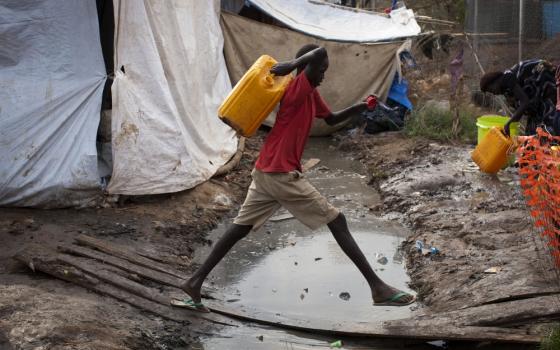This week’s entry is all-Africa, and – as always – we’ve tried to find at least a little good news.
Convent burned
But first the bad news: The convent and school of the Religious of the Assumption in Zinder, Niger, were looted and burned Jan. 16. The sisters escaped harm and are in temporary, but safe, housing. The parish and rectory were also torched.
The congregation reports that they had been targeted once before, but had been able to close the gate of the compound in time. Not this time.
The destruction – photos can be seen on the community’s Facebook page – was believed to have been wrought by mobs rioting in anger over the most recent issue of Charlie Hebdo, the satirical magazine targeted earlier by Islamic terrorists in Paris.
The BBC reports that at least four people were killed in rioting in Zinder. There were also protests in Pakistan, Sudan and Algeria.
Church sides with protesters
Things were ugly in the Democratic Republic of Congo, too, but for a different reason: There, people are protesting attempts to extend the presidency of President Joseph Kabila.
Kabila came to power in 2001, the BBC reports, and won a disputed election in 2011. Constitutionally prohibited from seeking another term, he now is pushing for elections to be held off until a nationwide census can be completed – a process that could take two to three years.
At least 11 people have been killed in sometimes violent protests – opposition leaders say the number of protesters killed by police is higher.
(GSR’s Sr. Joyce Meyer was visiting the country at this time, too, and had trouble finding roads open to get to the airport for her scheduled flight home, among other difficulties.)
The BBC said the Internet, text messaging and popular French radio station RFI have all been cut off, and at the University of Kinshasa, where there have been clashes for three days now, hundreds of young men were holding something of a siege. Reporters say dozens of students were killed over the past few days by live bullets fired by the police, including four on Wednesday morning when the Republican guard and the police stormed the campus.
But protesters also have a powerful ally backing their cause: the Catholic church.
Cardinal Monsengwo Pasinya said “certain political men, with the security forces” were those causing problems, and the elections must go on. "Stop killing your people,” Pasinya said in a statement.
The cardinal called on the public to challenge by all “legal and peaceful means any attempt to change laws that are essential to the electoral process.”
Love doesn’t see divides
But there is also good news: Though it seems the world is full of news that Christians and Muslims can’t get along, the international Sisters of Notre Dame de Sion seem to be thriving in Tunisia.
The sisters help staff a small nursery in the Tunisian coastal city of Nabeul, Vocation Network says, where up to 14 infants, from newborn to about nine months, are cared for with the help of the sisters and nine local Muslim women. The nursery provides a loving, homelike environment for babies while their unwed mothers decide if they are able to keep them.
Vocation Network says these sisters are part of a network of ministries provided by 13 different communities of Catholic sisters in Tunisia, from schools and learning centers, to libraries and health clinics. With the exception of tourists and the European expatriate community, all the people served by these institutions are Muslim.
Missionary Sisters of Our Lady of Africa (known as the White Sisters) staff a library, and the Franciscan Missionaries of Mary live among the unemployed and working poor on the edge of the Sahara.
Turns out, the best evangelization is not through force, but by example.
Thousands get shelter
In South Sudan, meanwhile, 2,500 families displaced by violence now have shelter, Catholic Relief Services reports.
When fighting broke out a year ago, CRS and others helped provide shelter in the form of shelter kits, but once the rainy season hit, people needed something more substantial.
The new, more robust shelters use locally available materials and the design preferences of the displaced communities. Local construction teams trained by CRS build homes with tarps, wood and bamboo poles using cross-bracing techniques that withstand high winds and rain.
The result is a larger, safer, stronger shelter and a small bit of comfort for those who have so little.
Remember, links, tips and accounts of the response to any crisis anywhere in the world are always welcome at [email protected].
[Dan Stockman is national correspondent for Global Sisters Report. Follow him on Twitter @DanStockman or on Facebook.]

